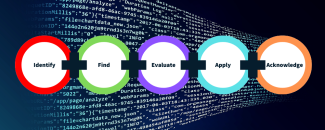Scientific literature (which is at the core of the training courses offered by ULiège Library) is not well understood by students (international surveys & survey in the French Community of Belgium).
These surveys reveal:
- a serious lack of understanding of the scientific literature circuit and documentary tools in science
- poor research strategies (a single keyword)
- ethical problems: plagiarism, copyright infringement
- the lack of a critical approach
Students (and researchers) do, however, need this skill to:
- carry out their individual work
- carry out their group work
- supplement a lesson
… get information for their own (life-long) education. The resources acquired are not limited to one’s studies!
Theoretical bases of the training courses
Scientific literature
(see: Intersections of Scholarly Communication and Information Literacy)
with training courses which:
- start with a strong understanding of the main tool for scientific communication: the scientific article
- involve the key people involved in scientific literature – the author and the reader
- cover the technical, financial, ethical and intellectual aspects of scientific literature
- incorporate all the networks for distributing this information, including the new web 2.0 circuits (social networks, discovery tools, etc.)
- consider the student and researcher as both recipients and producers of scientific information
Understanding all of the processes involved in creating scientific information is the crux of our training courses. This scientific culture enables students (and researchers) to be competent and critical. These processes are incorporated into the scientific-research process.
The concept of information literacy
This concept touches on the concepts of information culture and media culture. Being information literate and understanding scientific literature means:
- knowing how to recognise a need for information
- being able to locate information
- knowing how to assess and understand information
- knowing how to use information
A truly methodological approach
(see this BBF article)
- is based on a strong digital and technological culture (use of office and communication tools)
- goes beyond ‘push-button’ training courses that focus on one documentary tool in particular (understanding the world of scientific literature and its processes is important)
- a methodical research approach
- operates both upstream and downstream of the documentary research itself
- structures the transformation of an initial research question into a documentary question
A didactic approach
- specific to this type of transversal skill
- focused on the learner and their needs
- based on electronic tools that facilitate communication and implementation
- enables interaction and collaboration
With its own field of discipline (see the 5PMIS framework developed by ULiège Library, and the The three stages of Information Literacy Education infographic.)
The trained student should be able to answer questions such as:
- With what, and how, does documentary research start?
- What are the tools available to me when conducting this documentary research?
- When can one say that documentary search is complete? How does one conduct this research properly?
- How does one appraise the scientific quality of a document?
- Why and how does one correctly cite one’s sources?
- What is the attitude of publishers towards the open-access movement? To what does one need to pay attention?
- How does one implement an effective oversight process?
Go further
- ULiège publications on information literacy training courses (via ORBi)
- other recent publications (via JournalTOCs)
- the former website of the EduDOC Group
- the website of the ILIB Work Group
- Overview of Information Literacy Resources
- Worldwide and Information Literacy Resource Bank (Cardiff University)

